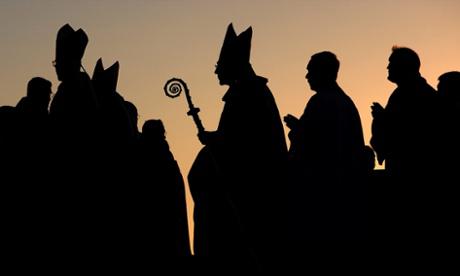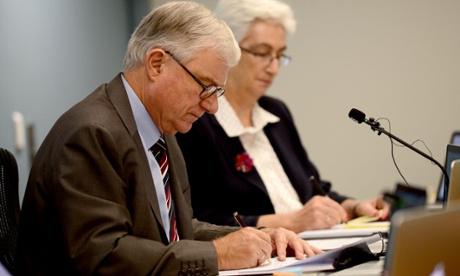|
The truth is that child abuse in Australia has a distinctively Catholic character
By Adam Brereton
The first year’s work of the royal commission into child abuse, compiled in their interim report released on Monday, is a grand achievement. Between the public hearings, private sessions with victims and the rigorous process of community consultation and scholarly research, the commission is already a triumph, however grim – a one-of-a-kind moment in Australian history. The interim report is largely a plea for a time and funding extension, and apologises for not yet offering definitive profiles of either perpetrators or institutions. However the information the commission has collected to date does at least allude to conclusions to come, one of them quite unsettling: that child abuse in Australia has a distinctively Roman Catholic character. The report records that 87% of alleged abusers were male, and 29% of those were clergy. The next largest group were teachers, at 16%, but the commission notes that "alleged perpetrators could be both members of the clergy and teachers". Catholic institutions were also the most commonly reported sites for abuse. Of 1,033 faith-based institutions reported to the commission, 68% were Catholic. When broadened out to include non-faith government and private sites, Catholics still comprised 41% of the total – the largest group. In one short section on page 123, the report notes that: "The Royal Commission wants to find out why there have been a significant number of perpetrators in certain institutions." The commission's scholarly research projects, 21 of which were completed by June 2014, identify which certain institution that is. Reviews of Canon Law, the histories of the Christian Brothers, De La Salle brothers, Sisters of Mercy and Salesians, and of submissions received on Towards Healing, the church's internal redress protocol, were all compiled over the last year. No similar studies were listed in the report for the Salvation Army, Anglican church or other similar faith-based organisations, let alone the Scouts or YMCA, who have also attracted the commission's scrutiny in private sessions. Beyond the report, the highest-profile public hearings held by the commission so far have examined Catholic institutions. The John Ellis case, in which Cardinal Archbishop George Pell defended the Sydney archdiocese's conduct and denied he had engaged in "lawfare" against Ellis, was the centrepiece of the first year. It's obvious that the Catholic church, for reasons of process and politics, must not be singled out explicitly at this stage. But as Justice Peter McClellan and his team continue to hear from survivors, a picture emerges of the commission as a contest between two organisations, two competing ways of structuring the world, two ways of approaching suffering: a hyper-competent, receptive, victims-focused commission; and an inwardly-looking, hierarchical and obstinate church. To point this out is not to diminish the experiences of survivors of other institutions – for example, those who fell pray to savagery at the hands of some in the Salvation Army – but to pay honest tribute to the commission's own provisional findings and to identify the hard task ahead. There are those in the church who have at every step attempted to steer the public away from such conclusions. They have attempted to depersonalise the problem, characterising it as a national challenge for all institutions rather than a looming battle between Catholic governance, and the courts and state. The latest such attempt was in a release from the church's Truth Justice and Healing. CEO Francis Sullivan wrote:
The church will support these measures because it knows the commission will propose specific remedies to address the nature and extent of Catholic abuse and that they will go further than any potential national scheme. There is the threat of the revocation of tax free status, the removal of the statute of limitations and caps on damages, mandatory incorporation and insurance for the church and so on. The Catholic church is everywhere shivering from the chill of US bankruptcies; the chance of future financial ruin in Australia is real. In contrast to the church's legal-financial focus – which has, in Pell's words, sought to "put to the proof" victims' experiences – the interim report’s second volume is concerned explicitly with building a record of trauma. This is perhaps the commission’s most important function; to make public victims' collective suffering heard after half a century or more of silence. While the interim report explicitly doesn't make recommendations, it's obvious where the commission is headed in terms of advice for the future. Survivors have often been re-traumatised by their experiences in both civil litigation and faith-based redress and compensation schemes, and have struggled to be heard by police and other authority figures. Reform will likely occur in these areas. That said, while the process so far is already driving significant cultural change both inside institutions and in society at large, there is significant danger in seeing the commission as a panacea, or its future findings as politically inevitable, natural or necessary. Not least of all, such a view will run up against those Catholics who want to fit the commission's final recommendations into the theme of a resurgent anti-Catholicism. The best response the church's leaders could make to the commission's interim report would be to see the data for what it is, ditch the PR approach, and spend the next four years resisting a slide into sectarianism and parochialism. Admitting the true extent of the abuse, or perhaps more narrowly, confessing to the fact that this is very much a Catholic problem, may be the only way the church can survive in this country.
|
.
Any original material on these pages is copyright © BishopAccountability.org 2004. Reproduce freely with attribution.

